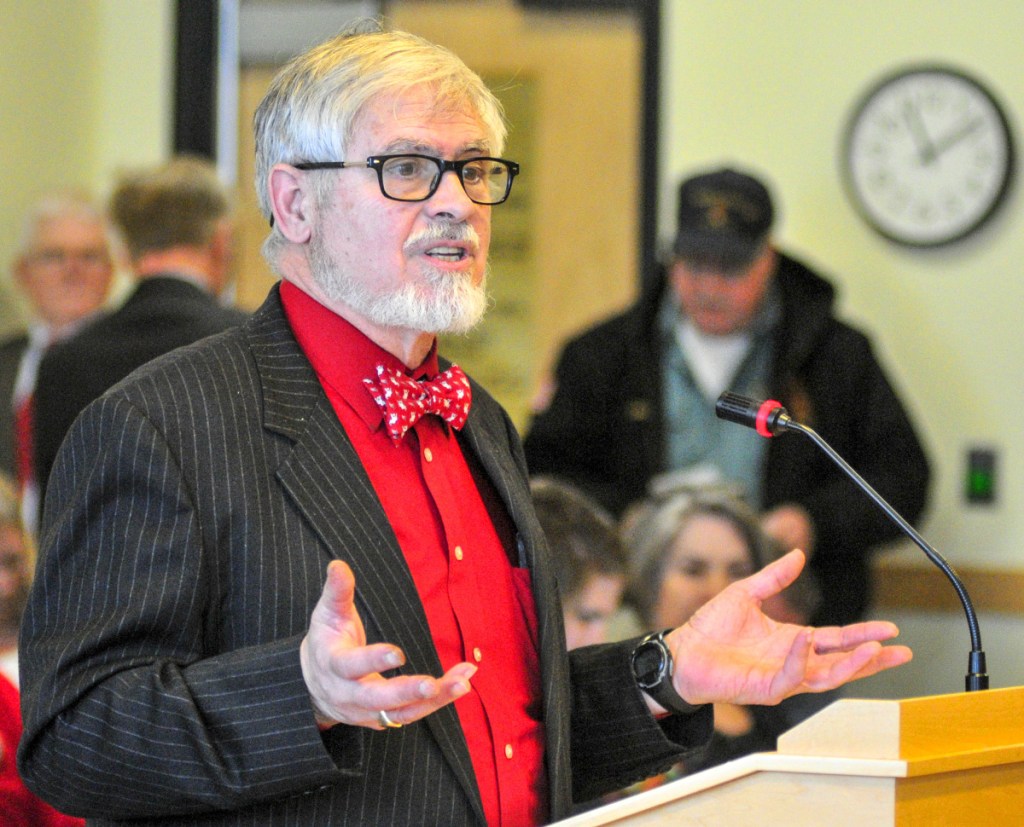Franklin County residents and elected officials will have the opportunity Monday night to question Central Maine Power Co. authorities about a proposed Quebec-to-Massachusetts power line that would run through six towns and about 33 miles of the county.
A meeting and question-and-answer session with CMP will be held from 6:30 to 8:30 p.m. at Mt. Blue High School in Farmington, according to a news release from the town of Wilton. Before the meeting, CMP officials will be on site starting at 5 p.m. with informational displays.
The meeting is being hosted by Wilton Town Manager Rhonda Irish and Sen. Tom Saviello, R-Wilton.
“The purpose of the meeting is for Franklin County residents to be able to ask questions,” Saviello said. “We’re making sure everybody has the same baseline for information.”
The proposed New England Clean Energy Connect project would bring 145 miles of new transmission line carrying hydropower from Quebec to Massachusetts through Maine via a deal between CMP and the Massachusetts Department of Public Utilities.
The line would enter Maine in Franklin County’s Beattie Township and run through about 12 miles of unorganized territory in Franklin County before detouring to Somerset County and re-entering Franklin County in Industry.
It also would pass through Jay, Wilton, Farmington, New Sharon and Chesterville.
With the exception of New Sharon, all of those communities, as well as Franklin County commissioners, have expressed support for the project, but Saviello said selectmen made decisions without complete information from CMP about the effect of the project or what kinds of benefits they could get out of it.
From 5 to 6:30 p.m. Monday, CMP officials will be available at the entrance to Mt. Blue with informational displays. At 6:30 CMP will present the plan for the transmission line, followed by an opportunity for town officials to ask questions from 7 to 7:30 p.m.
From 7:30 to 8:30 p.m. Franklin County residents will be able to ask questions. The meeting is open to the public, including those outside of Franklin County, but nonresidents will be allowed to ask questions only if time permits.
“This is for Franklin County,” Saviello said. “If residents in Somerset or Androscoggin counties have questions, they should encourage their elected leaders to hold a similar meeting.”
In early June, a Somerset County nonprofit group signed a memorandum of understanding on a mitigation plan that would result in CMP investing $22 million in conservation projects and nature-based tourism as compensation for the negative effects of the proposed transmission line crossing the Kennebec Gorge.
The company also estimates its project will result in $1.5 million in new property tax revenue in Franklin County, according to NECEC Project Manager John Carroll.
It has estimated the project will create around 1,700 direct and indirect jobs during construction and result in $73 million annually in compensation during construction.
Saviello, however, has pointed to competing proposals in Vermont and New Hampshire that were considered by the Massachusetts Department of Public Utilities as a reason Franklin County should see more benefits.
In May, Saviello, who also is the Senate chairman of the Committee on Environment and Natural Resources, was among four lawmakers who wrote to the Massachusetts PUC in opposition to the project.
The Natural Resources Council of Maine, which also opposes the project, likewise is encouraging residents to attend Monday’s meeting, saying in a news release this week the project would bring “little benefit and many downsides to Maine.”
“NRCM opposes this project because it would harm Maine’s environment while providing no new renewable energy and no reductions in climate-disrupting carbon emissions,” the release said. “CMP falsely calls its project ‘clean,’ but experts at the Maine Public Utilities Commission and elsewhere are uncovering a power-shifting shell game.”
Saviello said Friday despite his earlier opposition, he is not necessarily against the project.
It still needs several government permits in Maine, as well as an economic review from the U.S. Army Corps of Engineers and international border crossing authority from the State Department before it can be built.
“I just want us to be treated right,” Saviello said. “At the beginning, candidly, I was opposed to it, but right now we have more information and are trying to work with them. It wouldn’t be a fair negotiation if I was against the power line. I’m just trying to work on something that will benefit Franklin County in the long run.”
Rachel Ohm — 612-2368
Twitter: @rachel_ohm
Send questions/comments to the editors.



